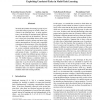Free Online Productivity Tools
i2Speak
i2Symbol
i2OCR
iTex2Img
iWeb2Print
iWeb2Shot
i2Type
iPdf2Split
iPdf2Merge
i2Bopomofo
i2Arabic
i2Style
i2Image
i2PDF
iLatex2Rtf
Sci2ools
127
click to vote
JMLR
2012
2012
Exploiting Unrelated Tasks in Multi-Task Learning
We study the problem of learning a group of principal tasks using a group of auxiliary tasks, unrelated to the principal ones. In many applications, joint learning of unrelated tasks which use the same input data can be beneficial. The reason is that prior knowledge about which tasks are unrelated can lead to sparser and more informative representations for each task, essentially screening out idiosyncrasies of the data distribution. We propose a novel method which builds on a prior multitask methodology by favoring a shared low dimensional representation within each group of tasks. In addition, we impose a penalty on tasks from different groups which encourages the two representations to be orthogonal. We further discuss a condition which ensures convexity of the optimization problem and argue that it can be solved by alternating minimization. We present experiments on synthetic and real data, which indicate that incorporating unrelated tasks can improve significantly over standard...
| Added | 27 Sep 2012 |
| Updated | 27 Sep 2012 |
| Type | Journal |
| Year | 2012 |
| Where | JMLR |
| Authors | Bernardino Romera-Paredes, Andreas Argyriou, Nadia Berthouze, Massimiliano Pontil |
Comments (0)

